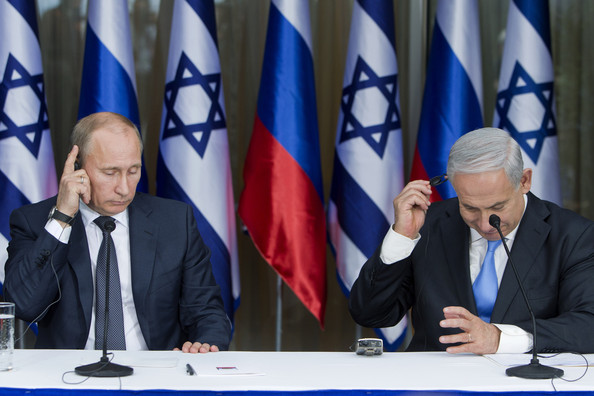One of the least-talked about questions is the coordination and cooperation between Israel and Russia in dealing with regional developments in the Middle East and how far this cooperation has gone in defending Israel’s security interests, particularly, against an expansionist Iran.
With the Syrian government winning the war against terrorism and the armed groups which rose to overthrow Al-Assad’s regime, Israel has warned against a permanent Iranian military presence in Syria. It has also raised alarm bells in relation with continuing Iranian support for Lebanon’s Hezbollah. Israeli security officials have been talking lately of Iran helping in the construction of an underground missile factory in Lebanon.
The Israeli prime minister, Benjamin Netanyahu, flew to Moscow on Monday 29 January to discuss with Russia’s President Vladimir Putin the threats to Israeli security from the future plans of Iran in Syria and Lebanon.
In commenting on his talks with the Russian president, he said Israel is interested in knowing Iranian intentions in Syria once the war ends. He made clear that if the Iranians continue strengthening their presence in Syria, his country will respond appropriately. He was probably referring to the use of force to keep Iran away from the Syrian-Israeli borders. Furthermore, he brought up the introduction of advanced weaponry into Lebanon, reaffirming that this situation would pose a serious threat to the security of Israel. He added that Israel has information regarding a missile factory being set up on Lebanese territory. He went on to say that Israel is not interested in escalation. However, it would react if need be.
On the other hand, he praised the level of trust between him and the Russian president, and described their talks in Moscow as “deep, frank, and direct.” He stressed that there are common interests between the two countries, while there are differences in opinions concerning some questions, without elaborating on the nature of these differences nor on the areas of disagreement.
Netanyahu’s visit to the Russian capital was followed by a visit by a high-level Russian security and political delegation to Israel on 30 January. The Russian delegation was led by the chairperson of the Security Council of the Russian Federation, and included officials from the Ministry of Foreign Affairs and the Ministry of Defence. The purpose of the visit, which came upon an invitation from the Israeli chairperson of the National Security Council, was to coordinate the military cooperation between Moscow and Tel Aviv in Syria, and exchange notes on how best to manage the post-war strategic environment in Syria and the wider Middle East in a way to preserve the security of all parties concerned, and in a way that would guarantee the tenuous balance of power in the Middle East. It is interesting to note the presence of a token Russian force deployed along the Syrian-Israeli borders. The mission of this force is to act as a buffer between Syria and Israel on the one hand, and to prevent the deployment of Iranian forces or pro-Iranian militias along these borders. According to an agreement reached last summer between the Americans and the Russians, no presence of Iranian troops nor forces backed by Tehran are allowed within 40 kilometres from Israel’s borders.
Iran has become the major threat for both Israel and the United States in the Middle East. And evaluating their new strategic postures, the enemy in the years to come will be Iran and all pro-Iranian militias in the region and the Gulf area, including the Houthis in Yemen. The common understanding between the Americans and the Israelis is that Tehran is bent on establishing what they have termed a “Shiite arc” over the Middle East that would extend from Iran in the east to Lebanon in the west. The Israeli minister of defence spoke on 30 January of Iran working to establish a “hanging rope” around Israel. Of course, the statement by the foreign policy adviser of Iran’s supreme leader that Iran will always be present in “persecuted countries” like Lebanon, Syria, Iraq, and Yemen, a few days ago, is not reassuring from an American and Israeli point of view. On the contrary, it deepens Israeli fears of the true intentions of Iran: that it would have permanent military bases in Syria once the country’s war grinds to a halt.
The Russian connection that Israel has cultivated during the last seven years dissuades both the Israelis and the Iranians from miscalculating, and it spares the Middle East, including Egypt, an all-out regional war that would be devastating in its consequences for many years to come. Hopefully, both sides would realise that a military confrontation is the worst scenario for all parties concerned. It is doubtful that there would be winners. From all indications, so far, it seems that this is not lost on all great and regional powers at play in Syria and in the wider region.
Hussein Haridy is former assistant to the foreign minister



